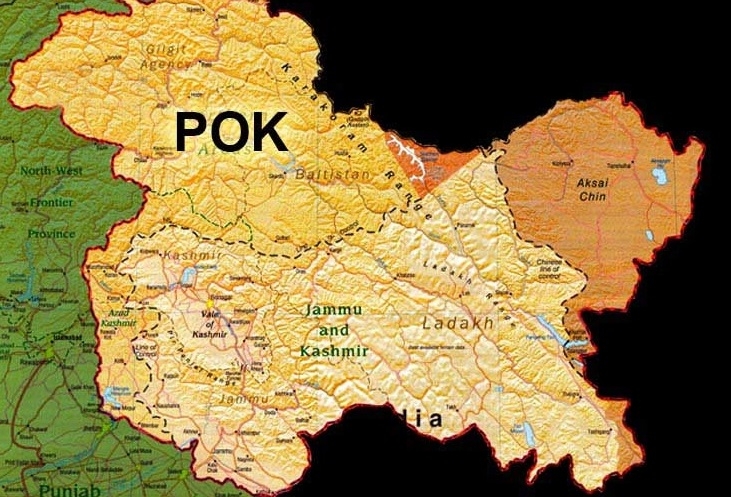THE POK RHETORIC
29 Aug 2024 11:32:14


By RAHUL DIXIT :
Taking back PoK is an
altogether different
ball-game which needs
new and shrewd
planning and loads of
patience to strike at the
right time. A lightning
quick military
operation to capture
PoK is still a possibility
for India’s Armed Forces
but it will be a
step laced with
extreme risks.
ONE of the worst
aspects of
Pakistan-occupied
Kashmir (PoK) is
that all
Governments have used PoK
as a political ploy rather than
a serious issue of national interest. There was a time when one
after another Indian leaders of
the Government of the day --
directly or indirectly related to
security and defence establishments -- kept shouting from
the roof-top that PoK was the
next, best and nearest target
and India would grab it back.
This was nothing but a serious
hoodwinking of the unsuspecting millions of common
Indians who felt charged first
and cheated later when a
deathly silence descended over
the political establishment in
succeeding months.
PoK is not -- and cannot be
-- to be treated as a political
ploy since it deals with a massive national emotion.
Hobnobbing with that emotion is being looked at by a large
section of society as a political
deception.
The PoK issue cannot be turned into a tool for
stoking public sentiments for
narrow political gains. It
deserves a deep thinking, specific strategy and foolproof
planning if India is actually
serious about taking it back.
Since the 1994 Parliamentary
resolution in both the Houses
to reclaim every inch of Indian
territory in possession of
Pakistan, the topic of PoK has
found mention in many a discourse -- diplomatic as well as
political. However, with no
clear strategy to get back our
part of Kashmir from Pakistan,
the issue has invariably turned
into rhetoric than policy.
Reclaiming PoK is a tactical
gambit which entails sustained
efforts on various platforms to
create international opinion in
India’s favour. Military action
against Pakistan might have
the backing of popular sentiment (and social media!) but
the ruling leadership is well
aware of the consequences of
even a small aggression into
disputed territories.
International opinion can turn
negative in a jiffy in light of the
Russia-Ukraine conflict as the
world would view India as an
aggressor without caring for
historic realities of Kashmir
and New Delhi’s stated position on PoK.
India’s current position in
the fast-changing world order
has been built through a strategic shift from non-alignment
to multi-purpose, multifaceted alignments which
makes it doubly imperative for
New Delhi to bring all hands
on the deck before thinking of
an adventurous exercise.
The
Foreign Ministry and diplomatic machinery did it pretty
successfully when the Centre
took the bold decision to scrap
Article 370 granting Special
Status to Jammu & Kashmir. It
caused consternation in only
a few Muslim countries as the
world largely saw it as India’s
internal matter.
Taking back PoK is an altogether different ball-game
which needs new and shrewd
planning and loads of patience
to strike at the right time. A
lightning quick military operation to capture PoK is still a
possibility for India’s Armed
Forces but it will be a step laced
with extreme risks. Any action
in the restive Gilgit-Baltistan
region in PoK would immediately draw China into direct
warfare as Beijing is highly
invested in the China Pakistan
Economic Corridor (CPEC)
passing through the region.
Apart from conventional warfare, China always relies on
covert actions like cyber attacks
and digital disruption.
The battle for PoK can easily transform
into a large-scale, multi-zonal
war with unaffordable military
and economic costs. Then
again, the long-drawn wars
going on between RussiaUkraine and Israel-Hamas have
shown the futility of a
direct conflict as many players
grab opportunities to side with
the two warring sides for their
own goals and keep the fire
burning.
Instead of making it a show
for the gallery, India can easily gain from the concealedwarfare technique by hurting
the China-Pakistan interests in
PoK. Gilgit-Baltistan has turned
into a tinder box following public unrest over Pakistan
Government’s handling of the
region. Violent public protests
and negative opinion about
Pakistan’s civil and army leaderships are steadily creating a
pro-India tilt among the masses. India must systematically
assist the unrest to keep the fire
burning (as is happening in
Balochistan) to make it difficult for China to take forward
the CPEC and wait for a civil
uprising. Another step that needs
immediate implementation is
mobilisation of international
attention towards the human
rights situation in PoK.
A media
blitz to expose the PakistanChina excesses in the occupied
region is the need of the hour
to serve India’s national interest. Highlighting the conditions
in Gilgit-Baltistan will also
bring back focus on the larger
region that the world seems
deliberately trying to ignore.
Instead of coming out with
political statements of “winning PoK back”, India can wisely use Gilgit-Baltistan as a tactical tool to soften up Pakistan
and keep China at bay. PoK
cannot become a shrill political rhetoric ending up in mere
posturing to Pakistan.The issue
of taking back Pakistan-occupied territories necessitates a
powerful, multi-dimensional
policy that will cover all bases
at home, including the entire
political class, and will resonate
in the wider international spectrum as India’s legal right on
its own region.